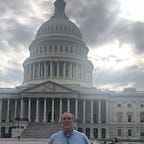Defining a Campaign To Solve Criminal Justice Cruelty By Voting
For way too long, candidates for public office have been able to brutalize formerly incarcerated people knowing there would be little to no cost at the ballot box.
Rapper and activist Meek Mill who was released yesterday (although still on probation) summarized the problem and the solution in an interview with Don Lemon on CNN earlier in the week:
“The interview concluded with Meek Mill warning young minorities in high risk neighborhoods to “be careful” when dealing with situations that may put them in contact with the justice system. But things can change, he said, if people go to the polls. “[The] most important thing I want to say is vote. When it’s time to vote for governor, when it’s time to vote for judges, D.A.s, vote. Let’s vote for people that are into justice reform and helping the urban community, because, we would have been affected by it, but we’re not moving and we’re not holding any political presence.”
Let’s face facts, as veteran reporter Steve Bailey mentioned multiple times during my podcast interview with him last week, “There are no votes in prisons.”
This needs to change.
About a week ago, I started playing with some ideas of how we might be able to activate the approximately 7 MILLION formerly incarcerated people, their families, their friends, and their allies to insist that candidates, regardless of political party, take criminal justice reform seriously.
This is what I came up with:
- There are 6–7 million formerly incarcerated people in this country who should have the right to vote — so first, my idea is to fight for the right to vote for ALL formerly incarcerated folks.
- All of us who are formerly incarcerated with the right to vote DO VOTE and that we ONLY vote for candidates who back REAL Criminal Justice Reform (meaning no impact neutering carve-outs and which address RACISM in our criminal justice system).
- We should go and ASK politicians directly what their positions are and hold them accountable.
- We should make common cause with intersectional groups fighting with us for change. Many formerly incarcerated folks, including me, are poor. There are MILLIONS of poor people in every State being silenced, erased, and attacked every day by State & Federal governments
- We stop limiting the discussion to only reducing mass incarceration (leaving millions of our brothers and sisters behind) by cutting half by 2020 (although I am for this too) and start also talking about creating MILLIONS of Formerly Incarcerated Voters across the country by 2020.
My goal is for this campaign, if it works, to take the form of a something like Black Lives Matter where there was plenty of leadership rising up all over the country but no official leaders.
In my opinion, this should be a leaderless and unfunded movement with no organizational structure, only people speaking out and sharing information and ideas.
Where incarcerated and formerly incarcerated people cannot vote, the family members, friends, and allies of incarcerated and formerly incarcerated people should start asking EVERY candidate running for public office to make their position on extending voting rights clear using a form something like this one:
#Bars2Ballots Candidate Pledge Form
- I believe people pay their debt to society when they serve their sentences
- I believe that there should be no taxation without representation.
I agree, if elected, to support (mark your choices):
__ Ending prison gerrymandering
__ Extending the Vote to Formerly Incarcerated People
__ Extending the Vote to Incarcerated People
<Signed and Dated>
I do not agree, if elected, to support any of these ideas
<Signed and dated>
Where incarcerated and formerly incarcerated people can vote, I would hope we would:
- Spread the news that formerly incarcerated folks can vote in that state
- Encourage people to join us in voting ONLY for candidates who support criminal justice reform (as operationally defined above).
- To join us in asking candidates what their positions are on the critical criminal justice reform issues that need support in each state.
- In all instances, the hashtag #Bars2Ballots would be used to show politicians that a large number of folks are starting to become active.
So, just to share a personal example. In the State of Michigan, where I live, formerly incarcerated people have the right to vote, assuming they register, from the first minute after they leave incarceration.
Since my release almost five years ago, I have become a criminal justice reform activist, voted in multiple elections and ballot questions, and have become a party member and delegate to my parties nominating committee. I have interviewed gubernatorial candidates, authors, journalists, and been consulted on policy issues.
Despite my political background as a Democrat, I will never vote for a candidate who does not support criminal justice reform. In other words, in a race between a Republican who does support criminal justice reform and a Democrat who does not. I will vote Republican.
I am active in trying to make my party better, but I don’t really care what jacket someone wears at political clubhouse meetings when issues that directly affect my life are on the line.
I became active, so I say everyday to candidates in Michigan, beware, because THIS IS WHAT DEMOCRACY LOOKS LIKE!
Josh is the co-host of the Decarceration Nation podcast, a blogger, and a freelance writer. Please consider following him on Twitter, throwing a tip into his hat on Patreon, showing your appreciation using Paypal.me, or adding OnPirateSatellite to your feeds.
